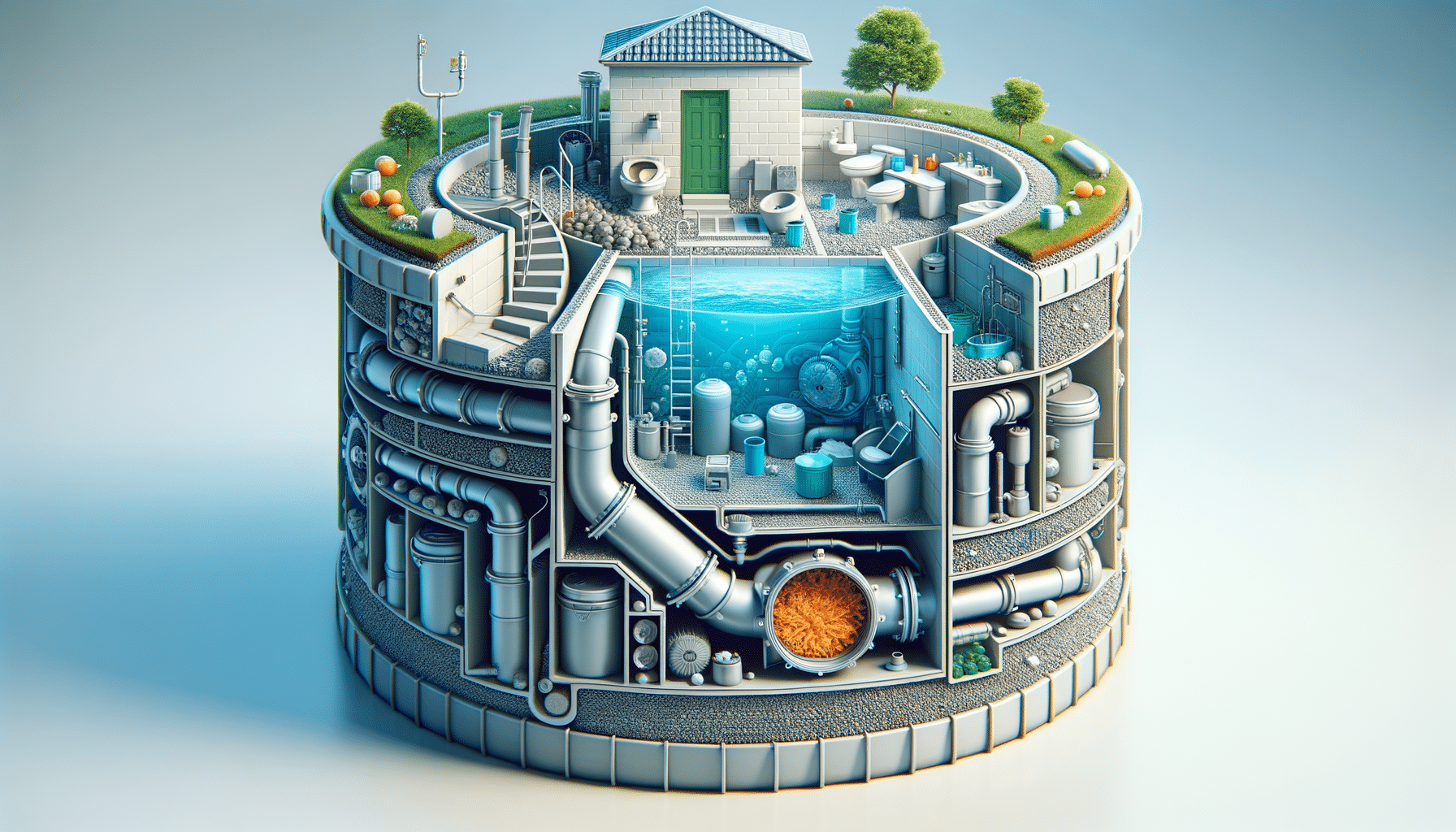
Discover how Septic tanks manage household waste offering low-maintenance, eco-friendly wastewater solutions
Understanding Septic Tanks
Septic tanks are a crucial component in managing household wastewater, especially in areas lacking access to centralized sewer systems. These underground structures are designed to provide an efficient, low-maintenance solution for waste management, making them an excellent choice for rural and off-grid living. A typical septic system comprises a septic tank and a drain field, working together to treat and dispose of wastewater safely.
The septic tank itself is usually made of concrete, fiberglass, or polyethylene, ensuring durability and longevity. Its primary function is to separate solids from liquids in the wastewater. As waste enters the tank, solids settle at the bottom, forming sludge, while lighter materials like grease and oils float to the surface, creating a scum layer. The remaining liquid, or effluent, flows into the drain field for further treatment.
One of the key advantages of septic tanks is their ability to promote natural waste decomposition. Bacteria present in the tank break down organic matter, reducing the volume of solids and minimizing the need for frequent pumping. This biological process is essential for maintaining the system’s efficiency and preventing environmental contamination.
Septic tanks are not only practical but also environmentally friendly. By treating wastewater on-site, they reduce the need for extensive sewer infrastructure and help conserve water resources. Additionally, they can be a cost-effective solution for homeowners, as they require minimal maintenance and have a long lifespan when properly cared for.
The Role of Septic Tanks in Waste Management
Septic tanks play a vital role in managing household waste, providing a reliable and sustainable alternative to traditional sewer systems. They are particularly beneficial in areas where municipal sewage services are unavailable or impractical. By processing waste on-site, septic tanks help reduce the environmental impact of wastewater disposal and promote responsible waste management practices.
One of the primary functions of a septic tank is to separate and store solid waste, preventing it from entering the drain field and potentially clogging the system. This separation process is crucial for maintaining the efficiency and longevity of the entire septic system. As solids accumulate in the tank, they must be periodically removed through pumping to ensure optimal performance.
The effluent that flows from the septic tank to the drain field undergoes further treatment as it percolates through the soil. This natural filtration process helps remove harmful pathogens and nutrients, protecting groundwater and surface water from contamination. In this way, septic tanks contribute to preserving local ecosystems and safeguarding public health.
Septic tanks also offer flexibility and adaptability for homeowners. They can be installed in various soil types and landscapes, making them suitable for a wide range of properties. Additionally, modern septic systems can be customized to meet specific needs, such as accommodating larger households or addressing unique environmental conditions.
Septic Tank Waste Disposal: Best Practices
Proper septic tank waste disposal is essential for maintaining the health and functionality of the system. By following best practices, homeowners can ensure their septic tanks operate efficiently and minimize the risk of environmental contamination. Regular maintenance, responsible waste management, and adherence to local regulations are key components of effective septic tank waste disposal.
One of the most important aspects of septic tank maintenance is regular pumping. Over time, solids accumulate in the tank, reducing its capacity and potentially leading to system failure. To prevent this, homeowners should schedule routine pumping every three to five years, depending on the size of the tank and household usage. This helps maintain the balance of solids and liquids in the tank, ensuring optimal performance.
In addition to regular pumping, homeowners should be mindful of what they dispose of in their septic systems. Only biodegradable waste should be flushed or drained, as non-biodegradable items can clog the system and disrupt the natural decomposition process. Common culprits include paper towels, sanitary products, and certain cleaning chemicals. By avoiding these materials, homeowners can protect their septic systems and prolong their lifespan.
Adhering to local regulations and guidelines is also crucial for responsible septic tank waste disposal. Many areas have specific requirements for septic system installation, maintenance, and inspection. By complying with these regulations, homeowners can ensure their systems meet safety standards and contribute to environmental conservation efforts.
Environmental Benefits of Septic Tanks
Septic tanks offer numerous environmental benefits, making them an attractive option for eco-conscious homeowners. By treating wastewater on-site, septic systems help reduce the demand for centralized sewer infrastructure and conserve valuable water resources. This localized approach to waste management minimizes the environmental footprint of wastewater disposal and supports sustainable living practices.
One of the key environmental advantages of septic tanks is their ability to promote natural waste decomposition. The biological processes occurring within the tank break down organic matter, reducing the volume of solids and minimizing the need for chemical treatments. This not only conserves energy and resources but also reduces the potential for harmful chemical runoff into local ecosystems.
Septic tanks also play a crucial role in protecting water quality. By filtering and treating wastewater before it reaches the drain field, septic systems help prevent contaminants from entering groundwater and surface water sources. This is particularly important in areas where clean water is scarce or where ecosystems are sensitive to pollution.
Furthermore, septic tanks can support biodiversity by maintaining healthy soil and plant life. The effluent released into the drain field provides essential nutrients for soil organisms and plants, promoting a balanced and thriving ecosystem. This natural fertilization process can enhance soil quality and contribute to the overall health of the environment.
By choosing a septic system, homeowners can actively participate in environmental conservation efforts and contribute to a more sustainable future. With proper maintenance and responsible waste management practices, septic tanks can provide a reliable and eco-friendly solution for wastewater disposal.
Septic Tanks: A Reliable Choice for Rural Living
For those living in rural areas, septic tanks offer a practical and efficient solution for managing household wastewater. With limited access to centralized sewer systems, rural homeowners rely on septic systems to provide a safe and effective means of waste disposal. By understanding the benefits and requirements of septic tanks, rural residents can make informed decisions about their wastewater management needs.
One of the primary advantages of septic tanks for rural living is their ability to operate independently of municipal sewer services. This independence allows homeowners to manage their wastewater on-site, reducing the need for costly infrastructure and minimizing the environmental impact of waste disposal. Additionally, septic systems can be customized to accommodate the unique needs of rural properties, such as varying soil types and landscape features.
Septic tanks are also well-suited to the self-sufficient lifestyle often associated with rural living. With proper maintenance and responsible waste management practices, septic systems can provide a reliable and low-maintenance solution for wastewater disposal. This allows rural homeowners to focus on other aspects of their property and lifestyle, without the burden of frequent repairs or system failures.
Furthermore, septic tanks can contribute to the overall sustainability of rural communities. By treating wastewater on-site, septic systems help conserve water resources and protect local ecosystems from contamination. This localized approach to waste management supports the preservation of rural landscapes and promotes responsible environmental stewardship.
In conclusion, septic tanks are a valuable asset for rural homeowners, offering a dependable and eco-friendly solution for managing household wastewater. By understanding the benefits and requirements of septic systems, rural residents can make informed decisions about their wastewater management needs and contribute to a more sustainable future.


